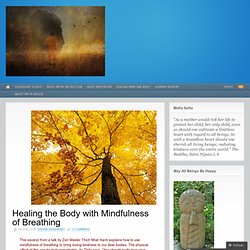

Mindfulness meditation training changes brain structure in eight weeks. Participating in an 8-week mindfulness meditation program appears to make measurable changes in brain regions associated with memory, sense of self, empathy and stress.

In a study that will appear in the January 30 issue of Psychiatry Research: Neuroimaging, a team led by Massachusetts General Hospital (MGH) researchers report the results of their study, the first to document meditation-produced changes over time in the brain's grey matter. "Although the practice of meditation is associated with a sense of peacefulness and physical relaxation, practitioners have long claimed that meditation also provides cognitive and psychological benefits that persist throughout the day," says Sara Lazar, PhD, of the MGH Psychiatric Neuroimaging Research Program, the study's senior author.
"This study demonstrates that changes in brain structure may underlie some of these reported improvements and that people are not just feeling better because they are spending time relaxing. " Meditation makes people more rational decision-makers - Science Fair: Science and Space News. Updated 2011-04-20 12:23 PM Meditation, the ancient practice of mindfulness employed by all major religions, can actually reprogram the brain to be more rational and less emotional, researchers in Canada and the United States say.

The researchers looked at a classic psychological test called the Ultimatum Game. In this test, researchers propose this scenario: A friend or relative has won some sum of money and then offers the test subject a small portion of it - will they accept the money? Surprisingly, despite the fact that it's a windfall, multiple tests over 30 years show that only about a quarter of people say yes.
The rest reply that it's not fair because the person offering the money has lots and that they should get more. People who practice Buddhist meditation behaved differently. The researcher involved 40 control subjects and 26 expert meditators. The study is in this month's edition of the journal Frontiers in Decision Neuroscience. As the researchers note in their paper:
Meditation May Protect Your Brain. For thousands of years, Buddhist meditators have claimed that the simple act of sitting down and following their breath while letting go of intrusive thoughts can free one from the entanglements of neurotic suffering.

Now, scientists are using cutting-edge scanning technology to watch the meditating mind at work. They are finding that regular meditation has a measurable effect on a variety of brain structures related to attention — an example of what is known as neuroplasticity, where the brain physically changes in response to an intentional exercise. A team of Emory University scientists reported in early September that experienced Zen meditators were much better than control subjects at dropping extraneous thoughts and returning to the breath. The same researchers reported last year that longtime meditators don’t lose gray matter in their brains with age the way most people do, suggesting that meditation may have a neuro-protective effect.
Where does all this lead? Healing the Body with Mindfulness of Breathing « Metta Refuge. This excerpt from a talk by Zen Master Thich Nhat Hanh explains how to use mindfulness of breathing to bring loving-kindness to our dear bodies.

The physical effect of this can be truly remarkable. As Thây says, “You should really love your body. You should really take care of your body. Mindful breathing, with rest, can do miracles. The First Exercise of Mindful Breathing My dear friends, yesterday I spoke about the first exercise proposed by the Buddha concerning mindful breathing: “Breathing in, I am aware that I am breathing in; breathing out, I am aware that I am breathing out.” Keys to Meditation - iAwake. Do Nothing for 2 Minutes.
Learn how to meditate and enjoy the benefits!